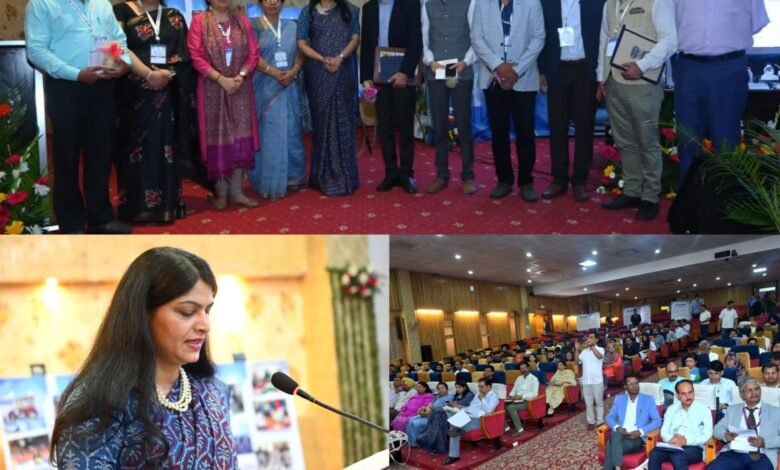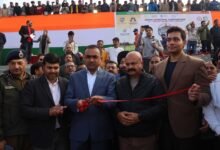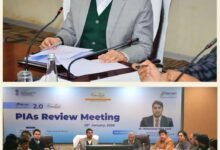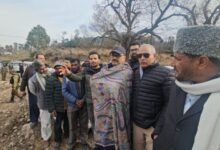JKRLM’s 2-day regional workshop on ‘Rural Livelihoods’ begins at SKUAST Kashmir

JKRLM Hosts Regional Workshop To Boost Rural Livelihoods Across Northern States At SKUAST Kashmir
“Event Focuses on Strengthening SHG Impact Through Innovation, Market Integration, and Technological Advancements”
Aadil Bashir Dar
Srinagar, July 09: A two-day Regional Workshop on Rural Livelihoods commenced today at Sher-e-Kashmir University of Agricultural Sciences and Technology (SKUAST) Kashmir, focusing on enhancing Self-Help Group (SHG) livelihoods through convergence.
The workshop, hosted by Jammu and Kashmir Rural Livelihoods Mission (JKRLM), brings together representatives from six states and Union Territories.
The event is part of a series of five regional workshops organized across India’s Lakhpati Didi zones. It aims to deepen, strengthen, and expand livelihood opportunities for rural women in Jammu and Kashmir, Ladakh, Punjab, Haryana, Himachal Pradesh, and Uttarakhand.
The workshop was inaugurated by Secretary, Ministry of Rural Development, Shailesh Kumar Singh, Additional Secretary, NRLM, MORD, Charanjit Singh, Secretary, Ministry of Tourism, V Vidyavathi, Secretary, Rural Development and Panchayati Raj, J&K, Dr Shahid Iqbal
Choudhary.
Additional Mission Director JKRLM jammu Division Mridhu Slathia Additional Mission Director JKRLM Kashmir division ,Reyaz Ahmad Beigh ,State Project Managers/District Project Managers/Block Project Managers, Technical Support Agencies, convergence partners of Ministry of Rural Development, subject matter experts from various quarters from both farm and non-farm livelihoods and NRLM team members.
In her welcoming address, Mission Director, JKRLM , Indu Kanwal Chib expressed the honor JKRLM felt in hosting this significant regional workshop on rural livelihoods.
She highlighted the importance of bringing together representatives from six states and Union Territories to strategize on enhancing rural livelihoods through various interventions and approaches.
She highlighted the significance of the event in bringing together representatives from six states and Union Territories to discuss and strategize on enhancing rural livelihoods through various interventions and approaches.
Joint Secretary, NRLM, MoRD, GoI, Swati Sharma, emphasized the need for innovation and technological adaptation in strengthening rural livelihoods.
Sharma highlighted the potential of the six Northern State Rural Livelihood Missions (SRLMs) and stressed the importance of building on past successes to drive future growth.
Addressing the rapid technological changes, Sharma emphasized, “Time has come when we can’t be blindfolded to the technological changes happening around us and time has come when our Didis have to be not only tech savvy but also have to make their unique presence felt at the global level.”
The Joint Secretary outlined critical areas for improvement, including access to formal credit systems, infrastructure, marketing avenues, advanced technologies, and entrepreneurial skill sets. She noted, “We at NRLM understand that access to formal credit systems, access to good infrastructure and resources, access to marketing avenues, access to advanced technologies in the livelihoods sector, access to better and new designs, access to raw materials, access to sustainable supply chains, access to banking services at the door steps of SHG Didis, access to customised training and capacity building avenues and access to entrepreneurial skill sets is critical to achieve the desired objectives.”
In his address, Secretary, Ministry of Rural Development, Shailesh Kumar Singh highlighted rural livelihoods as a critical component in this journey, acknowledging the numerous challenges faced, including limited infrastructure, inadequate access to credit, employment issues, and skill gaps.
However, he pointed to the extensive network of self-help groups (SHGs) as a powerful tool for addressing these challenges.
The Secretary stressed the importance of building reliable supply chains for rural products and leveraging digital platforms for marketing.
Emphasizing the need for collaboration, Singh stated, “We can’t do anything without the state governments. They are our most important partners.”
He also highlighted recent efforts to expand partnerships beyond agriculture into non-farm sectors, including manufacturing and services.
Additional Secretary, NRLM, MORD, Charanjit Singh highlighted significant human resource (HR) challenges that are hindering the effective implementation of NRLM programs, particularly in northern states.
Singh emphasized the critical need for filling vacant posts, providing timely increments, and establishing a robust HR policy to ensure the smooth operation and success of various developmental initiatives.
Addressing the specific challenges in the non-farm sector, Singh pointed out that the implementation of various interventions is impossible without a strong HR foundation. He urged colleagues from different states to prioritize recruitment and retention of quality staff.
The workshop covered crucial aspects of livelihood, including value chain improvements, market linkages, service sector growth, and technological interventions.
Experts from diverse fields, including tourism, textiles, agriculture, animal husbandry, food technology, and meteorology, contribute to the dialogues.
The workshop’s first session, ” Strengthening Value Chain interventions- Producer Companies/ Producer Enterprises,” focussed on optimising the flow of products and services from production to consumption, enhancing efficiency, market access, and profitability. Panellists, including experts from various fields such as handicrafts, horticulture, and organic farming, are discussing challenges in production, processing, and marketing, as well as explored successful models that can be adapted for northern Indian states.
A second session focused on the “Sub Sector Approach” in which targets specific commodities in farm and non-farm livelihoods, aimed to develop product-specific clusters for more efficient results were discussed. The panellists included experts from sectors like sheep husbandry, scientific research, and tribal cooperatives.
The final session, “Deepening Market Linkages,” addressed the critical need to enhance market reach and profitability for Self-Help Groups (SHGs) and women-led enterprises. The panel features representatives from various institutions including the Indian Institute of Packaging, National Institute of Fashion Technology, and Confederation of Indian Industry.
The Deendayal Antyodaya Yojana-National Rural Livelihoods Mission (DAY-NRLM) currently works with over 10 crore women SHG members across India. In the northern region alone, it supports nearly 27 lakh SHG members across 92 districts.





